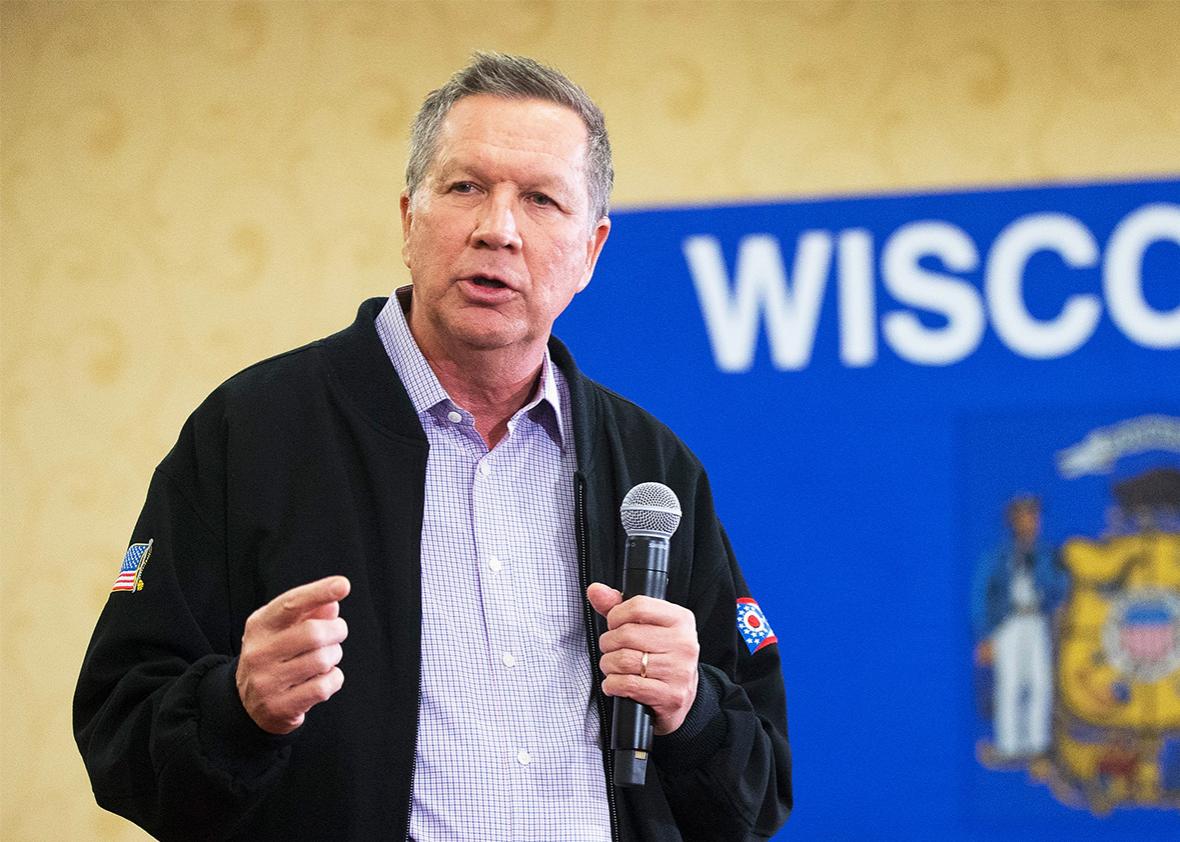In Tuesday night’s Arizona Republican presidential primary, Ohio Gov. John Kasich finished in fourth place to Florida Sen. Marco Rubio, who had suspended his campaign the previous week. Between the contests in Arizona and Utah, Kasich picked up zero delegates. Such an abysmal showing this late in the process, which dug his delegate hole to nearly 600 behind front-runner Donald Trump and about 300 behind Texas Sen. Ted Cruz, should have marked the end of his campaign. But according to Kasich’s strategy for winning the nomination, these latest punishing losses were immaterial.
There’s something very, very wrong with this.
His only remaining chance of winning the nomination, by taking his case to the convention, doesn’t hinge on winning more states or delegates for himself prior to it. Even if he were to finish with 250 or 300 delegates as compared to his current total of 143, or win two or three states instead of his current one, it wouldn’t mean anything; he’ll end in a distant third place either way. It’s true that Kasich’s continued participation is of some use to the GOP’s efforts to topple Trump, who is still very much headed for a plurality of delegates but can be blocked from getting a majority: Kasich can compete with Trump in Northeastern states like Pennsylvania where Cruz cannot. But Kasich has already been mathematically eliminated from reaching his own first-ballot delegate majority. His “campaign” now is about swaying delegates at the convention toward casting votes that are far different from the ones they were sent to Cleveland, by actual voters, to cast.
These primary voters are themselves irrelevant to Kasich’s grand scheme. If that sounds like the old days when state primaries weren’t determinative of the nominee and party officials sorted everything out at the convention, that’s because it would be. The precedent of a Kasich nomination at this point would be to establish that presidential primaries only matter when the voters go along with the preferences of a party’s establishment.
Actually, the plural preferences here may be incorrect. The party establishment really only has one preference: electability, since getting one party’s candidate elected over the other party’s is the purpose of a political party establishment.
November electability is the entirety of Kasich’s pitch to convention delegates, since he cannot argue in good faith that he represents Republican voters’ will. When he says that “neither Cruz nor Trump can win the general election [but I can],” though, Kasich makes a strong argument. The latest poll from Bloomberg pins Trump’s favorability at 29 percent versus 68 percent who view him unfavorably. Cruz is similarly stuck at 32 percent favorable to 55 percent unfavorable. Meanwhile, Kasich scores a positive favorability rating at 46 percent to 32 percent. In head-to-head matchups with likely Democratic nominee Hillary Clinton—also an unpopular politician, with a 44 percent favorable to 53 percent unfavorable score—Trump and Cruz lose to the former secretary of state by 18 and 9 points, respectively. Kasich beats her by four.
Kasich may be correct about electability, but it’s an argument Republican voters have been unresponsive to this cycle, as evidenced by Trump and Cruz’s success. We went along with moderates Mitt Romney and John McCain when they told us to, and how did that turn out? is a sentiment that members of the Republican base express with great frequency at campaign events, conservative confabs, and on talk radio call-in shows. McCain and Romney were each probably the most electable Republican candidates in 2008 and 2012, respectively, even if they didn’t win their general elections. But no matter. Their failures, plus Republican voters’ hatred of their party establishment, have reflexively led base voters to do the opposite of what the establishment tells them to do this time around. Though that may be irrational, it is what the voters have chosen to do, and that is supposed to count for something.
Since this cycle’s (remaining) electable candidate, Kasich, isn’t gaining much traction among voters with his case, he’s planning to take it straight to convention attendees to whom voters’ nominating powers are delegated. Delegates tend to be Republican activists or officials in local, state and federal parties, the thinking goes, so they might be more receptive to the idea of nominating based on electability. That would run counter to delegates’ interest in staying true to Republican voters’ stated preferences, of course, and perhaps not causing riots. But the only things bounding them to do so after the first ballot are ethical norms, which in American public life are rapidly being torched to nothingness.
If Kasich wins the nomination after effectively determining that primary voters’ preferences needn’t count, then that establishes primary voters’ preferences needn’t count. At least a Cruz nomination at the convention after a strong second-place primary finish would acknowledge and respect the anti-establishment signal voters have been sending the GOP. Nominating Kasich would be a middle finger to primary voters. They didn’t want to play along this time? Well, here’s what happens.
Then the GOP will have to ask itself: Once the cat’s out of the bag that voters can signal one preference and convention delegates can do something else entirely, why bother hosting primaries?
